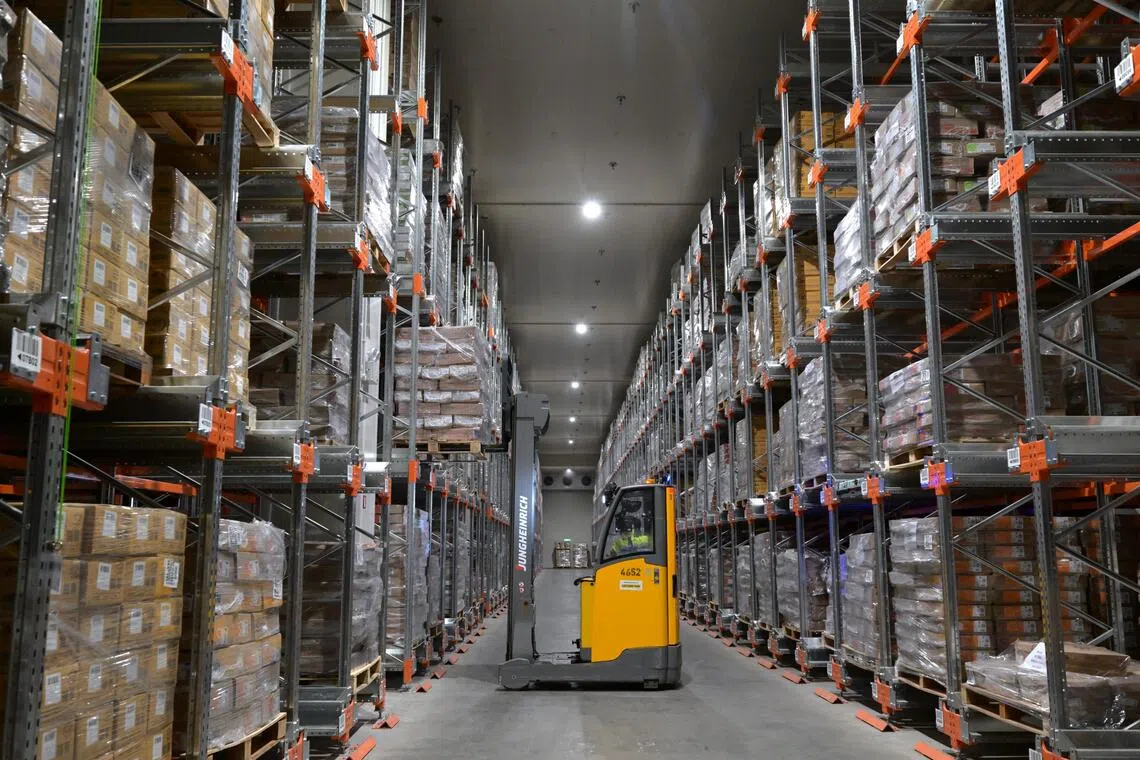Current food stockpiling in Singapore includes proteins like chicken
Sign up now: Get ST's newsletters delivered to your inbox

Food stockpiling is one of the pillars under Singapore’s food security strategy.
ST PHOTO: NG SOR LUAN
SINGAPORE – In a cavernous cold room one-third the size of the Padang, frozen chicken is stockpiled in rows of carton boxes as part of Singapore’s food security efforts.
The 13,500 sq m facility is about 90m long and 10m high, kept as cold as minus 23 deg C, and can store up to 20,500 pallets.
Operated by supply chain and logistics firm YCH Group, it is one of the food stockpiling sites in Singapore.
Apart from frozen chicken, these stockpile sites have other food products, including canned food and rice, even though only rice is currently required by law to be stockpiled.
Food stockpiling is one of the pillars of Singapore’s food security strategy, alongside import diversification, local production and global partnerships.
This is to counter disruptions brought about by factors such as climate change, pandemics and geopolitics, said Senior Minister of State for Sustainability and the Environment Zaqy Mohamad during a visit on Oct 22 to the cold room, which is at an undisclosed location.
“We have evolved our stockpiling strategy to cover today’s needs and are looking at potential threats or disruption that may come ahead,” he said, adding that the current food stockpiling also includes proteins like chicken.
Keeping stockpiles of staples can help to safeguard the Republic from supply chain disruptions, which can be caused by erratic weather patterns due to climate change, for instance.
Citing the example of the chicken export ban Malaysia had imposed for a few months in 2022 as it struggled to meet its own poultry demand, Mr Zaqy said Singapore cannot take its food supply for granted.
Singapore’s stockpiles are important because “as a responsible government, we have to plan forward, whether it’s disruptions due to pandemics, Covid or even food bans”, he said.
Singapore is constantly monitoring the food security situation, as needs may change and new technologies may evolve, he added.
The media was given a tour of the food stockpiling site ahead of the Singapore International Agri-Food Week 2025 in November.
The Food Safety and Security Bill
But there are currently no plans to extend the stockholding requirement beyond rice.
During a doorstop interview, Mr Zaqy said that whether or not the requirement is expanded to include other food items depends on the risk assessment that Singapore has based on current needs.
Besides food stockpiling, he emphasised the other pillars on the food security front.
“(Food stockpiling) complements what we do for growing local, diversifying our food imports as well as (strengthening) our global partnerships across the world to make sure that Singapore has safe and secure access to food,” he said.
Currently, Singapore imports more than 90 per cent of its food needs from 187 countries and regions. The Republic is also aiming to produce 30 per cent of its nutritional needs locally by 2030
When asked if local production affects how much Singapore stockpiles food, Mr Zaqy said it is more of a case of risk assessments.
“For example, if you find that climate change is going to affect crops all over (the world) or you find a threat assessment that we are going to be hit with another pandemic... you have to then assess whether I could increase my stockpiles in advance,” he noted.
Regarding the development of global partnerships for food security, Mr Zaqy said that Singapore works with countries such as Brazil and Japan on this front.
“Global partnerships... mean being able to access markets, being able to ensure food safety standards are met.
“It’s not just about importing from one source, but it’s also about ensuring that there are relevant food safety standards that we work together on. Sometimes, that also means making sure that we are also alerted to, for example, disease outbreaks and making sure that we’re able to contain some of these source constraints in different countries,” he said.



